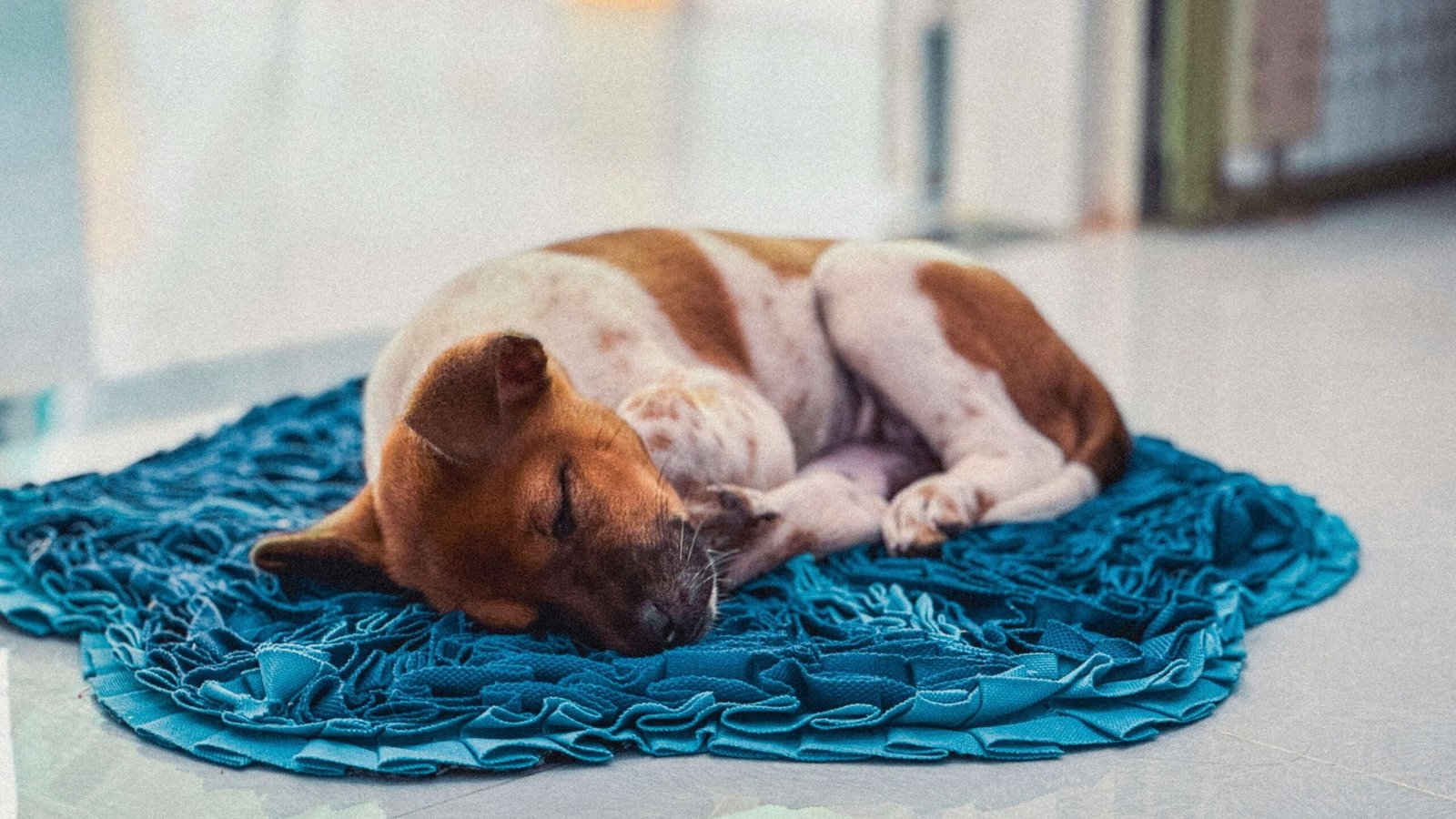Why Is My Dog Breathing Fast in His Sleep?
Watching your dog breathe rapidly while sleeping can be alarming, especially if it’s not something you’ve noticed before. While occasional fast breathing during sleep is often harmless, it can sometimes indicate an underlying issue that requires attention. Dogs, like humans, experience different stages of sleep, including REM (rapid eye movement), which can cause changes in their breathing patterns.
However, there are other factors—ranging from environmental influences to medical conditions—that could contribute to this behavior. In this blog post, we’ll explore the possible reasons behind your dog’s rapid breathing during sleep, how to identify normal versus abnormal patterns, and what steps to take if you’re concerned about your furry friend’s well-being.
Common Causes of Fast Breathing During Sleep
There are several reasons why your dog might breathe quickly while sleeping. Understanding these causes can help you determine whether the behavior is normal or a sign of something more serious. Here are some common explanations:
Dreaming or REM Sleep : Dogs often dream during REM sleep, which can cause irregular breathing patterns, including panting or rapid breaths.
Environmental Factors : High temperatures or humidity in the room can lead to faster breathing as your dog regulates their body temperature.
Stress or Anxiety : If your dog had a stressful day, they might process those emotions in their sleep, leading to faster breathing.
Physical Activity Before Bed : Intense exercise or play right before bedtime can elevate your dog’s heart rate and breathing even after they fall asleep.
Underlying Health Issues : Conditions like heart disease, respiratory infections, or pain can cause abnormal breathing patterns during sleep.
While many of these causes are harmless, persistent or severe fast breathing should always be evaluated by a veterinarian to rule out medical concerns.
Signs That Fast Breathing May Be a Concern
Not all instances of fast breathing in dogs are cause for alarm, but certain signs can indicate a potential problem. Here’s what to look out for:
Labored Breathing : If your dog seems to struggle to breathe or makes unusual sounds, it could signal a respiratory issue.
Excessive Panting : Continuous panting without an obvious reason, such as heat or exercise, may point to discomfort or illness.
Restlessness During Sleep : Frequent tossing, turning, or waking up abruptly can suggest pain or discomfort.
Blue Gums or Tongue : This discoloration indicates oxygen deprivation and requires immediate veterinary attention.
Behavioral Changes : Lethargy, loss of appetite, or reluctance to move can accompany abnormal breathing patterns.
If you notice any of these symptoms alongside fast breathing, it’s important to consult a vet promptly to ensure your dog’s health isn’t at risk.
Check this guide 👉Why Does My Dog Sleep With Their Head Propped Up? Best 7 Tips
Check this guide 👉Why Does My Dog Sleep Between My Legs? Best 7 Expert Tips!
Check this guide 👉Why Does My Dog Sleep Under My Bed? Best 7 Expert Tips!

Normal Reasons for Fast Breathing | Abnormal Reasons for Fast Breathing |
|---|---|
Dreaming during REM sleep | Heart disease or heart failure |
Hot or humid environment | Respiratory infections or obstructions |
Stress or anxiety | Pain or injury |
Physical activity before bed | Allergic reactions or poisoning |
Excitement or overstimulation | Neurological disorders |
How to Help Your Dog Breathe Easier During Sleep
If your dog’s fast breathing is not linked to a medical issue, there are steps you can take to make their sleep environment more comfortable. Here are some practical tips:
Regulate Room Temperature : Keep your dog’s sleeping area cool and well-ventilated to prevent overheating.
Provide a Comfortable Bed : A supportive, orthopedic bed can reduce pressure on joints and improve overall comfort.
Reduce Stress : Create a calming bedtime routine, such as gentle petting or playing soft music, to help your dog relax.
Limit Exercise Before Bed : Avoid intense activities at least an hour before bedtime to allow your dog’s body to wind down.
Monitor Their Diet : Ensure your dog isn’t eating too close to bedtime, as digestion can sometimes disrupt sleep and breathing patterns.
By making these adjustments, you can create an environment that promotes restful sleep and reduces the likelihood of fast breathing episodes.
When to Consult a Veterinarian
While occasional fast breathing during sleep is usually nothing to worry about, certain situations warrant a visit to the vet. Here’s when you should seek professional advice:
Persistent Fast Breathing : If your dog frequently breathes rapidly during sleep, it could indicate an underlying issue.
Changes in Behavior : Sudden shifts in sleep habits or daytime energy levels may signal health problems.
Visible Discomfort : Whining, whimpering, or showing signs of pain while sleeping requires investigation.
Weight Loss or Gain : Unexplained changes in weight can be linked to conditions affecting breathing.
Chronic Snoring or Snorting : These noises might indicate airway obstructions or structural issues in the throat.
Early intervention is key to addressing potential health concerns, so don’t hesitate to reach out to your veterinarian if you’re unsure.
Breeds Prone to Breathing Issues
Some dog breeds are more susceptible to breathing difficulties due to their physical characteristics or genetic predispositions. If your dog belongs to one of these breeds, it’s important to be extra vigilant about their respiratory health. Here’s what you should know:
Brachycephalic Breeds : Dogs like Bulldogs, Pugs, and Shih Tzus often have narrow airways, making breathing harder during sleep.
Large Breeds : Breeds like Great Danes or Irish Wolfhounds may experience heart-related issues that affect breathing patterns.
Toy Breeds : Small dogs such as Chihuahuas or Yorkshire Terriers are prone to tracheal collapse, which can cause labored breathing.
Active Working Breeds : Breeds like Border Collies or German Shepherds may breathe rapidly after intense exercise, even during rest.
Sighthounds : Greyhounds and Whippets have unique physiology that can make them more sensitive to temperature changes, affecting their breathing.
Understanding your dog’s breed-specific risks can help you identify potential problems early and take preventive measures to ensure their comfort.
How to Calm Your Dog Before Sleep
A calm and relaxed state before bedtime can reduce the likelihood of fast breathing during sleep. Here are some techniques to help your dog wind down:
Create a Routine : Establish a consistent pre-sleep routine, such as a short walk or quiet playtime, to signal that it’s time to rest.
Use Calming Scents : Lavender or chamomile diffusers can create a soothing atmosphere in your dog’s sleeping area.
Massage Therapy : Gently massaging your dog’s muscles can relieve tension and promote relaxation.
Limit Screen Time : Avoid loud noises or stimulating activities, like watching TV, near your dog’s bedtime.
Provide Mental Stimulation : Puzzle toys or treat-dispensing games earlier in the evening can tire your dog mentally and physically.
By incorporating these calming practices, you can help your dog transition smoothly into a peaceful night’s sleep.
Signs Your Dog May Be Overheating
Overheating is a common cause of rapid breathing in dogs, especially during warmer months or in hot environments. Recognizing the signs of overheating can prevent serious complications. Here’s what to watch for:
Excessive Panting : Rapid, shallow breaths that don’t slow down even in cooler conditions.
Bright Red Gums : Discolored gums can indicate heat stress or dehydration.
Lethargy : A sudden lack of energy or unwillingness to move may signal overheating.
Vomiting or Diarrhea : These symptoms can accompany heat-related distress and require immediate attention.
Warm Skin or Body Temperature : Feeling excessive heat on your dog’s skin or belly is a warning sign.
If you suspect your dog is overheating, move them to a cooler area, provide water, and contact your vet if symptoms persist. Early intervention can prevent heatstroke and ensure your dog stays safe.
Frequently Asked Questions About Fast Breathing in Dogs
Is it normal for dogs to breathe fast in their sleep?
Yes, it can be normal, especially during REM sleep, but persistent or labored breathing should be checked by a vet.
What is a normal breathing rate for dogs while sleeping?
A healthy sleeping respiratory rate for dogs is typically 10-30 breaths per minute.
Can stress cause fast breathing during sleep?
Yes, stress or anxiety can affect your dog’s breathing patterns, even while they’re asleep.
Should I wake my dog if they’re breathing fast?
Generally, no—let them sleep unless they seem distressed or unwell.
How can I tell if my dog is dreaming or having trouble breathing?
Look for additional signs like twitching, relaxed facial muscles (dreaming) versus labored breathing or restlessness (potential trouble).
Ensuring Your Dog’s Peaceful Rest
Fast breathing during sleep can be unsettling to witness, but understanding its potential causes can help you respond appropriately. Whether it’s due to harmless dreaming or a sign of an underlying condition, staying observant and proactive is essential. By creating a comfortable sleep environment, monitoring your dog’s behavior, and seeking veterinary care when needed, you can ensure your furry companion enjoys restful nights and vibrant days. Remember, your dog relies on you to advocate for their well-being—so trust your instincts and prioritize their health whenever you notice something unusual.
Canned Pumpkin for Cat Diarrhea: Best 7 Expert Tips! Natural remedy to firm stools, soothe upset bellies, and support gut health safely.
Can a Cat Give You Scabies? Best 7 Expert Tips! Discover the truth about feline mites, human skin risks, and how to protect yourself—without panic.
Cat Flea vs Human Flea: Best 7 Expert Tips! Discover the truth about bites, species, and how to eliminate infestations for good.
Weird Cat Behaviors: Best 7 Expert Tips! Discover why cats do strange things—and how to understand, not punish, their instincts for a happier home.





